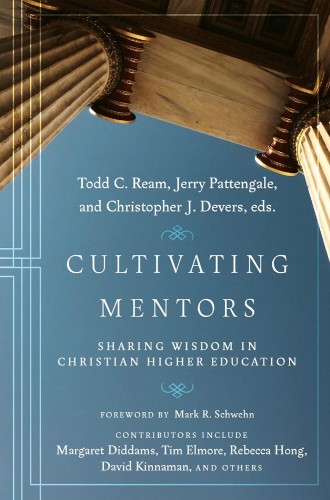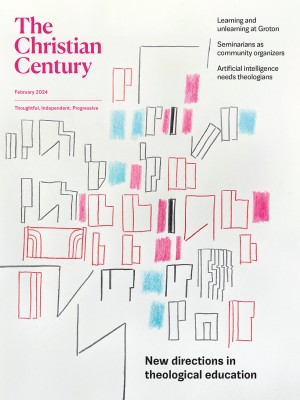Mentoring is about relationship
A new essay collection explores the importance of mentorship to students and faculty at Christian colleges.
Before he departs to fight in the Trojan War, Odysseus entrusts his son, Telemachus, to the care of his friend and counselor, Mentor. While the origin of the word may have fallen into oblivion, the concept of mentorship is ubiquitous. Amid a plenitude of how-to-mentor books, Cultivating Mentors stands out because of its focus: mentorship in the context of Christian higher education. The book’s seven chapters provide a detailed picture of the current generation of college students and lay out vocational and mentorship principles based on the Christian tradition.
While most of the chapters approach mentoring from practical and theoretical angles, Beck Taylor’s essay is a testimony to the power of mentoring. Taylor, the president of Samford University, stresses the impact his mentors have had on his academic and professional life, from his undergraduate years at Baylor University to his graduate studies and his life as a professor and administrator. For him, mentoring is a two-way street: mentors share their knowledge and advice with younger colleagues, while they “often benefit from the renewed energy and fresh perspectives of their mentees, thereby adding to their own well-being and sense of flourishing.”
Read our latest issue or browse back issues.
In Tim Elmore’s contribution, the leadership consultant lists this experience, which he calls “reverse mentoring,” as one of three important strategies college administrators can use in coaching students. The other two are “organic or ‘spot’ mentoring” and “organized mentoring.” Organic mentoring happens when administrators engage spontaneously with students in public places, such as the dining hall. These encounters can become micro-mentorship lessons for students. Organized mentoring, on the other hand, takes place in regular meetings over the course of a semester or academic year. In Elmore’s experience, both organic and organized mentoring help meet the spiritual, emotional, and academic needs of Christian college students.
Barna Group president David Kinnaman’s essay points out that faith-forming institutions, such as homes and churches, have been replaced by social media and search engines. In a Barna study, only 14 percent of Gen Zers report that they meet with a mentor on a regular basis and only 11 percent serve as mentors. Meanwhile, church affiliation is on the decline, with 22 percent of young people ages 13 to 20 leaving their faith behind. Of those Gen Zers who attend church, 88 percent experience a sense of belonging, and 64 percent have an emotionally close relationship with a church member. For Kinnaman, these numbers are encouraging. They suggest that some Gen Zers might be open to mentoring, which would probably boost their biblical and theological literacies.
When young evangelicals arrive on college campuses, they tend to be materialistic, nationalistic, and fatalistic, observes sociologist Tim Clydesdale. Most of them are unable to understand the concept of vocation, which, according to Clydesdale, rests on two key elements: discernment and summoning. Discernment involves self-reflection, while summoning means “obeying the call of God to work that clearly needs doing.”
Rebecca C. Hong, an administrator at Loyola Marymount University who specializes in educational equity and efficiency, writes about how human-centered design might help us improve our mentoring efforts. Organizations that have adopted a human-centered design approach recognize people as their biggest asset. They also value flexibility and the need for connection. Hong’s essay is useful in a post-COVID context, although it does not provide ideas about how human-centered design might be implemented at Christian colleges, nor does it make the connection between human-centered design and mentoring explicit.
Organizational psychologist Margaret Diddams highlights the importance of mentoring young faculty members at Christian colleges. She shows how three distinct mentoring models—institutional, interactional, and inclusion—encompass key elements that help newly minted PhDs in their socialization process. The institutional model focuses on the role that the institution and its administrators play. The interactional model pays attention to a new faculty member’s self-efficacy, role clarity, and social acceptance, while the inclusion model aims to create a sense of belonging.
Mentorship that fails to cultivate a sense of belonging will perpetuate pain and exclusion, particularly for minority students and faculty, contends Duke Divinity School dean Edgardo Colón-Emeric in his chapter. For people of color, working in predominantly White institutions is often “a pilgrimage of pain and hope toward a new we,” he writes:
This new we rejects living apart and responding to difference with fear and fearmongering. The new we dreams of more than living side by side. The ordinary virtues of tolerance and civility are valuable and even necessary, but they are only a step on the way. “Coexist” may be a good bumper sticker for navigating the complex cloverleaf exchanges of theological education, but it is a bleak billboard for the destination. A new we dreams of living together.
Like many Hispanic and Latinx theologians, Colón-Emeric uses the term mestizaje to describe this imagined new community. Mentoring seminary and divinity school students of color means “mentoring pilgrims for an honest and hopeful mestizaje in the theological academy,” he writes.
As helpful as this essay collection is for both new and seasoned mentors within Christian higher education, the book noticeably leaves out the question of how to mentor LGBTQ+ students and faculty. As a recent College Pulse survey showed, 30 percent of students at Christian colleges identify as nonheterosexual. Might the concept of a new we that Colón-Emeric introduces also include those students and faculty? As saturated as the mentoring book market is, it seems there is space for at least one more book.






